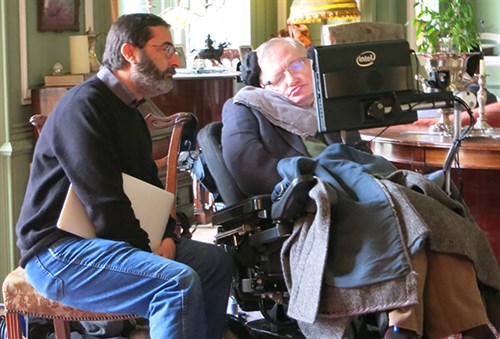I - 34151 Trieste Italy
(+39) 040 2240 111
pio@ictp.it

15/03/2018 - Trieste
On a day--14 March--when the world was celebrating Pi (3.14) and Albert Einstein’s birthday, it was also mourning the passing of noted physicist Stephen Hawking. Hawking died at his home in Cambridge, UK. While scientists knew him for his work in cosmology and black holes, millions of others were influenced by his popular science book "A Brief History of Time" and by his appearances in popular culture.
As international tributes spread across the Internet, the loss of Hawking was keenly felt at ICTP, where many of his theories are studied. Director Fernando Quevedo is a colleague of Hawking at Cambridge's Department of Applied Mathematics and Theoretical Physics as a professor of theoretical physics there. "Knowing, seeing and interacting with Stephen have been some of the most extraordinary experiences in my life. He was an exceptional human being, and I feel so fortunate to have had the opportunity to meet him," said Quevedo.
Hawking's scientific legacy will affect many generations of scientists to come, predicted Quevedo. "His work on cosmology and black holes is extremely important and will remain so forever." Quevedo elaborated, "This work created a big puzzle that Hawking himself identified: how is it that information seems to be lost in a black hole? Scientists have tried for decades to solve the problem, yet it remains unsolved."
Hawking's influence on the general public, through the popularity of his books and appearances in popular culture is impossible to measure, said Quevedo. "Many of today's scientists were inspired by reading his books, or by listening to him; his impact is invaluable."
One such scientist is ICTP physicist Bobby Acharya, whose work on particle phenomenology spans both theory and experiment (the latter with CERN's ATLAS experiment). "Hawking had a huge impact on my entire career," he said, adding, "There are quotes from his book, 'A Brief History of Time', that have shaped my research."
Acharya pointed out that he and Hawking were academically related: Acharya's supervisor, Chris Hull, was in turn supervised by Gary Gibbons, whose supervisor was Hawking. Acharya recalled, "The first thing Hawking ever said to me was, "I am your great-grandfather". He added, "In recent years I realized that he has become a symbol for mankind. People looked to him for reason and truth. In this era of fake news and not knowing who to trust, his death is a real loss."
Quevedo not only appreciated Hawking's scientific accomplishments, but also his humanity, his sensitivity and wit, and his huge sense of humour and adventure. "He loved Indian food and was known to have a whiskey every now and then," said Quevedo, adding, "He used to tell everyone that he was born on the day that Galileo died. He will be deeply missed, both by his Cambridge colleagues and the whole world; he is impossible to replace."
Hawking's daily struggle to thrive scientifically was inspiring, and provides a ray of hope for ICTP scientists from developing countries. "He worked under conditions that were difficult as a human being," said Quevedo. "By overcoming his physical difficulties, Hawking showed that you can struggle, but if you dedicate your life to it you can achieve a lot. In that sense, he was a role model for all of us."
Related links: